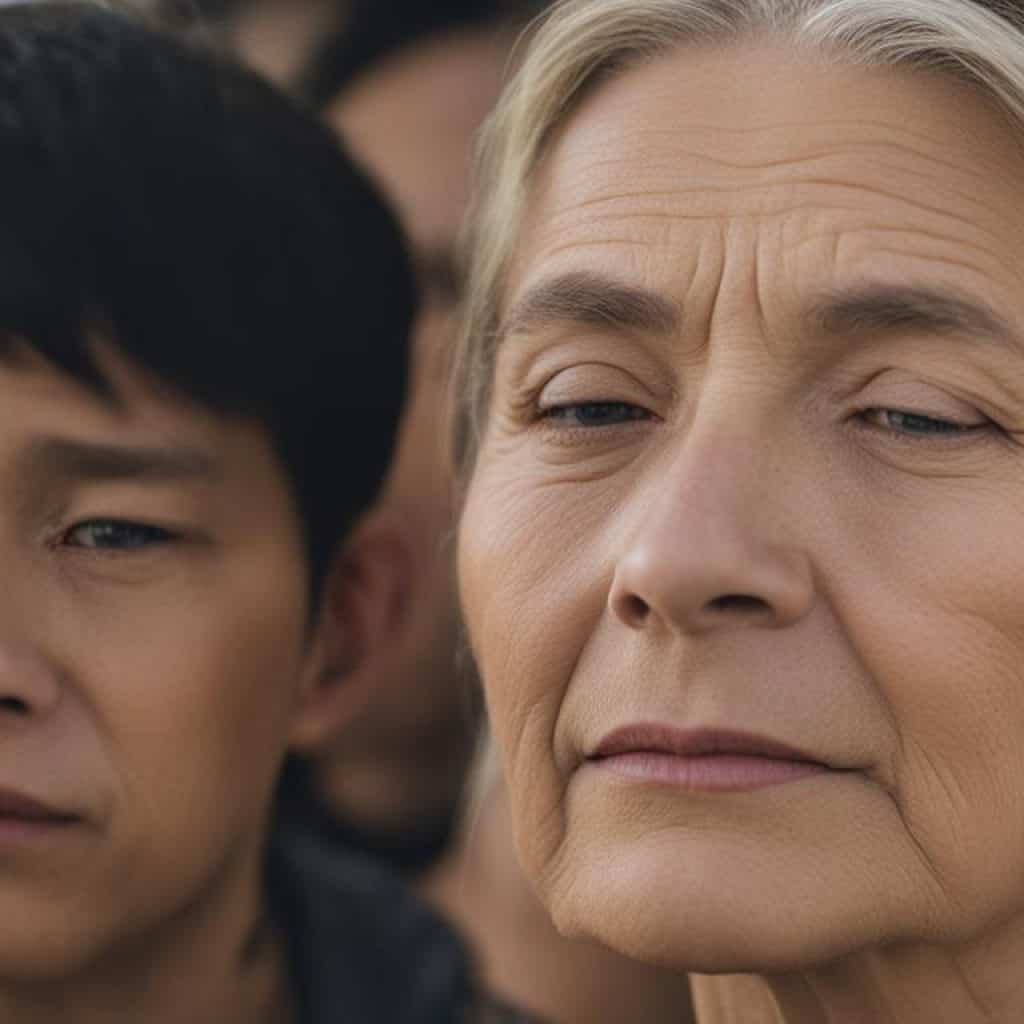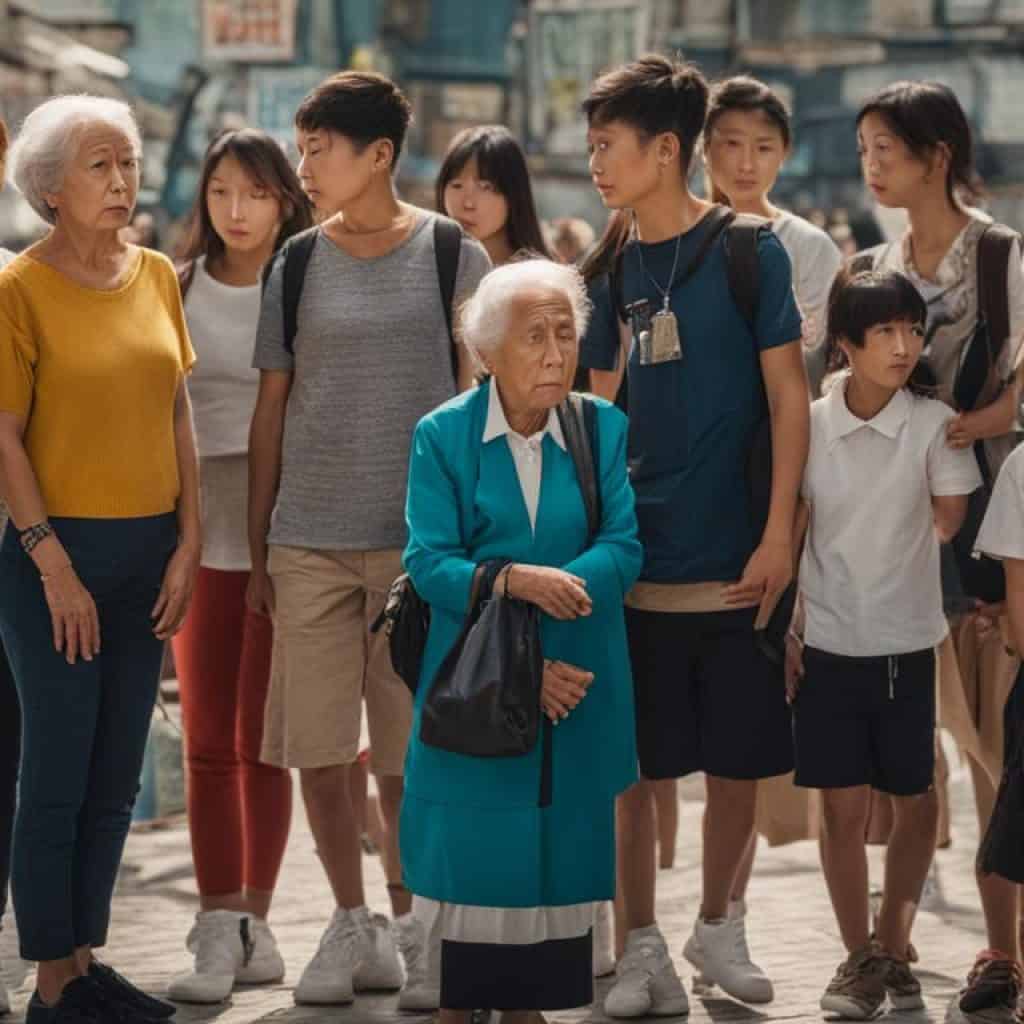As I stood at the brink of turning 50, I couldn’t help but feel a mix of emotions. Was this the beginning of old age? Would I suddenly become less relevant in the world? These thoughts echoed in my mind as I reflected on the societal expectations that often come with reaching middle age.
But then I looked around me and saw vibrant individuals in their 50s and beyond, making significant contributions to society. They were CEOs, artists, activists, and mentors, proving that age is not a barrier to personal and professional growth.
Age, I realized, is just a number. It is not the sole determinant of our accomplishments or the value we bring to the world. In fact, reaching 50 can mark a period of increased self-awareness and the ability to pursue our goals with confidence.
So, if you find yourself on the cusp of turning 50 or have already crossed that milestone, let’s explore the truth about life after 50 and embrace the possibilities that lie ahead. It’s time to redefine what it means to be “old” and unlock the potential within us.
Key Takeaways:
- Age should not be the sole determinant of accomplishments and success
- Reaching 50 can mark a period of increased self-awareness and confidence
- Embrace the possibilities and redefine what it means to be “old”
- Explore the truth about life after 50 and unlock your potential
- Age is just a number – it’s how you approach life that truly matters
Age is just a number
When it comes to age, it’s important to remember that it’s just a number. Age should never be seen as a fixed indicator of capabilities or limitations. In fact, with advancements in technology and easy access to knowledge, individuals of any age can adapt their lives and pursue new opportunities.
One of the greatest advantages that come with age is the wealth of life experience and wisdom gained over the years. This accumulated knowledge can be an invaluable asset in various aspects of life, including career development and personal growth.
With the rise of remote work and the widespread use of technology, individuals over 50 are now presented with more career opportunities than ever before. The ability to work from anywhere and connect with a global audience has opened doors for older individuals to explore new avenues and gain recognition for their expertise.
The experience and wisdom gained over the years can be invaluable assets in various aspects of life, including career development and personal growth.
Age is not a barrier to success or the pursuit of one’s dreams. It’s important to embrace the idea that there are no limits to what can be achieved at any stage of life. As individuals continue to grow, learn, and adapt, they can carve out fulfilling and prosperous paths for themselves.
Remember, age is just a number, and it’s never too late to chase your dreams and set new goals. As the saying goes, “You’re not getting older, you’re getting better!”
Life Experience and Career Opportunities
The table below highlights the advantages of life experience and the career opportunities available to individuals of all ages:
| Advantages of Life Experience | Career Opportunities |
|---|---|
| Wisdom gained over the years | Leadership roles |
| Ability to navigate challenges | Mentorship positions |
| Strong work ethic | Consulting opportunities |
| Problem-solving skills | Entrepreneurship |
| Extensive professional network | Peer collaboration |
The combination of life experience and career opportunities can pave the way for fruitful and fulfilling journeys, regardless of age. It’s time to embrace the idea that age is just a number!
Aging gracefully
Aging is often associated with physical decline, but research suggests that age-related changes are more influenced by factors such as physical activity and healthy lifestyle choices rather than chronological age. By incorporating regular exercise and adopting a nutritious diet, individuals can maintain physical fitness and overall well-being as they age.
Physical activity plays a crucial role in aging gracefully. Engaging in activities such as walking, swimming, or yoga can help improve cardiovascular health, muscle strength, and flexibility. Regular exercise also promotes healthy weight management and reduces the risk of chronic conditions such as heart disease, diabetes, and osteoporosis.
Adopting a healthy lifestyle goes beyond just physical activity. It includes making conscious choices about what we eat and how we take care of our bodies. A well-balanced diet rich in fruits, vegetables, whole grains, and lean proteins provides essential nutrients to support cellular function and promote longevity. Drinking plenty of water and limiting the consumption of sugary beverages and processed foods further contributes to optimal health.
In addition to physical well-being, mental well-being is a crucial aspect of aging gracefully. As individuals gain wisdom and life experience, they also develop a better understanding of themselves and what brings them happiness. Embracing a positive mindset and adopting healthy habits for mental well-being can greatly enhance the aging process.
“Aging is not lost youth but a new stage of opportunity and strength.” – Betty Friedan
Practicing self-care activities, such as meditation or engaging in hobbies and interests, can help reduce stress, improve cognitive function, and enhance overall mental well-being. Taking time for oneself and prioritizing mental health allows individuals to approach aging with a positive attitude and a sense of fulfillment.
In conclusion, aging gracefully is not solely determined by chronological age but rather influenced by physical activity, a healthy lifestyle, and mental well-being. By staying physically active, making nutritious choices, and prioritizing mental health, individuals can embrace the aging process with strength, vitality, and a positive outlook.
The power to change your life
Age should never be a limiting factor when it comes to making changes in life. Whether it’s reinventing yourself, pursuing a new career, or shifting your mindset to chase your dreams, it’s never too late to take control and create the life you desire.
Reinvent Yourself:
Don’t let your age dictate what you can or cannot do. It’s never too late to explore new passions, learn new skills, or embark on a different career path. Remember, life is about continuous growth and self-discovery. Embrace the opportunity to reinvent yourself and unleash your true potential.
Career Change:
Feeling unfulfilled in your current job? Dreaming of pursuing a different career? Don’t let age be a barrier. Many successful individuals have made career changes later in life and achieved incredible success. Evaluate your passions and strengths, and take the necessary steps to transition into a career that aligns with your true calling.
Mindset Shift:
Often, the biggest obstacles we face are self-imposed limitations. Challenge the preconceived notions and self-doubts that may hold you back. Adopt a growth mindset, believing in your ability to learn, grow, and adapt. A simple shift in mindset can open doors to endless possibilities and pave the way for personal and professional growth.
“The only thing standing between you and your dreams is the story you keep telling yourself about why you can’t achieve them.” – Jordan Belfort
Pursuing Dreams:
It’s never too late to pursue your dreams. Whether it’s starting a business, writing a book, or traveling the world, take the first step towards making your dreams a reality. Create a plan, set actionable goals, and stay committed to the journey. Remember, age brings wisdom, experience, and a unique perspective that can fuel your pursuit of dreams.

| Age | Pursuing Dreams |
|---|---|
| 30s | Establishing stability and exploring initial ambitions. |
| 40s | Reevaluating priorities and taking calculated risks. |
| 50s | Embracing wisdom, pursuing passions, and making significant life changes. |
| 60s and beyond | Continuing to learn, grow, and inspire others through lifelong pursuits. |
Wondering What’s Next
Many empty nesters find themselves at a crossroads in life after their children have grown and left the nest. With this major life transition, it is natural to question one’s purpose and wonder what comes next. However, this phase of life can also be seen as an opportunity for self-discovery and personal growth. It is a chance to explore new passions, redefine one’s identity, and pursue long-held aspirations.
Empty nesters have the freedom and flexibility to embark on new adventures and embrace exciting life changes. Whether it’s a career change, starting a business, or going back to school, this phase of life offers the space and time to pursue aspirations that may have been put on hold while raising children.
It is essential for empty nesters to take the time to reflect on their personal desires and goals. By mapping out a path to achieve these aspirations, they can create a sense of purpose and fulfillment in this new chapter of life. This process may involve self-reflection, exploring new hobbies or interests, and seeking guidance or support from mentors or coaches.
“This is a time to embrace new opportunities and re-evaluate what truly brings you joy and fulfillment. It’s never too late to pursue your dreams and create a life that aligns with your passions and values.”
For empty nesters, life transitions can be both challenging and exciting. It’s important to approach this phase with an open mind and a positive outlook. By embracing change, exploring new possibilities, and pursuing aspirations, empty nesters can create a fulfilling and purposeful life beyond their children’s departure from home.
| Benefits of Exploring New Aspirations | Challenges and Considerations |
|---|---|
|
|
Old is about how you feel
The concept of being “old” is subjective and heavily influenced by societal perceptions and stereotypes. It is essential to challenge these perceptions and focus on individual self-perception. How one feels and views themselves is more important than their actual age. By reframing the idea of age and breaking free from societal expectations, individuals can embrace a more positive and empowering perspective on aging.
“Age is an issue of mind over matter. If you don’t mind, it doesn’t matter.” – Mark Twain
Age should never be a barrier to personal growth and fulfillment. It is not the number of years that defines a person, but rather their mindset and self-perception. Rather than adhering to society’s limiting beliefs about aging, individuals should focus on their own feelings of vitality, purpose, and inner strength. Aging is an opportunity to challenge stereotypes and prove that age is not a limitation to achieving one’s goals.
Reframing Age: Embracing a Positive Mindset
Embracing a positive mindset is key to breaking free from stereotypes and preconceived notions about aging. By cultivating self-awareness and challenging negative beliefs, individuals can reshape their perception of age and tap into their full potential. This involves shifting the focus from physical limitations to mental and emotional well-being.
- Practice self-care and prioritize your physical and mental health.
- Engage in activities that bring joy and fulfillment.
- Surround yourself with positive and supportive relationships.
- Stay curious and continue learning throughout life.
- Set new goals and pursue your passions, regardless of age.
Remember, age is not a static state but a journey of growth and self-discovery. Breaking free from societal stereotypes allows individuals to embrace their true potential and live a life that defies expectations. It’s never too late to rewrite the narrative and create a fulfilling and meaningful future.
Breaking free from stereotypes is crucial for individuals to embrace a more positive and empowering perspective on aging. By prioritizing self-perception over societal expectations, individuals can redefine what it means to grow older and lead fulfilling lives at any stage.
50 is not old
Age should not be a barrier to personal growth and fulfillment. Contrary to popular belief, reaching 50 is not a decline but rather a period of increased wisdom, clarity, and understanding. As individuals age, they gain a better understanding of themselves and their desires, which can lead to a more empowered and fulfilling life. Embracing one’s age and the experiences that come with it can lead to a more positive and fulfilling perspective on life.
“With age comes wisdom and understanding. Embrace the journey of aging and discover the beauty that comes with it.”
When we think of 50, we often associate it with old age. However, this is a misconception that fails to consider the valuable wisdom and clarity that comes with experience. At 50, individuals have weathered the storms of life, gaining a deeper understanding of themselves and the world around them. This newfound wisdom becomes a guide as they navigate the different aspects of their lives.
With age comes clarity. The fog of youth dissipates, and individuals gain a clearer vision of their goals, aspirations, and priorities. They no longer feel the need to chase after societal expectations or conform to the pressures of others. Instead, they embrace their authentic selves and make choices that align with their values and desires.
Understanding oneself is a journey that unfolds over time. By the age of 50, individuals have had ample opportunities for self-reflection and introspection. They have faced challenges, overcome obstacles, and learned valuable lessons along the way. This deep understanding of oneself enables them to make decisions with confidence, ensuring alignment with their authentic selves.
Embracing age means embracing the wisdom, clarity, and understanding that it brings. It means appreciating the experiences and lessons learned, and using them as a compass for the future. Embracing age allows individuals to live authentically and wholeheartedly, free from the societal pressures and judgments that come with youth. Embracing age is a celebration of the journey and a testament to the incredible growth that comes with it.
So, let go of the notion that 50 is old. Instead, see it as an opportunity to embrace the wisdom, clarity, and understanding that age brings. Embrace the experiences and the lessons learned. Embrace the person you have become and the person you are still becoming. Because at 50, life is just getting started.
What younger generations consider old
Perception of age can vary among different generations, often influenced by societal stereotypes and misconceptions about aging. Younger individuals may have a different view on what is considered “old” compared to older generations. These generational views can shape how we understand and interact with individuals of different age groups.
Studies have shown that younger individuals may perceive middle age as the start of old age. This perception may stem from societal stereotypes that associate middle age with physical and mental decline. However, it is important to challenge these misconceptions and promote a more accurate and positive understanding of aging.
Contrary to popular belief, many older individuals tend to feel younger than their actual age. This self-perception can be attributed to various factors, such as maintaining good physical health, staying mentally active, and having a positive mindset. Older individuals often have valuable life experience and wisdom that can contribute to personal growth and societal progress.
Challenging societal stereotypes
It is crucial to challenge societal stereotypes that categorize individuals based solely on their age. These stereotypes can limit opportunities for personal and professional development and create barriers to understanding and collaboration between different age groups.
“Older people are often seen as technologically inept or resistant to change. This stereotype overlooks the fact that many older adults actively embrace new technologies and contribute to the digital age.”
By promoting intergenerational dialogue and understanding, we can break down these stereotypes and foster a more inclusive society. Recognizing the diverse perspectives and strengths of different age groups can lead to valuable collaborations and a more holistic approach to problem-solving.
Promoting a positive understanding of aging
Shifting the perception of aging is crucial to create an environment where individuals of all ages can thrive. It is important to emphasize the value and contributions of older individuals in society. By highlighting their achievements, capabilities, and ongoing pursuits, we can challenge societal stereotypes and promote a more accurate and positive understanding of aging.

Encouraging intergenerational collaboration
Bringing together individuals from different age groups can foster innovation, creativity, and mutual learning. Recognizing the unique perspectives and experiences that each generation brings to the table can lead to richer discussions, increased empathy, and a more inclusive society.
“Intergenerational collaboration can generate new ideas, challenge conventional thinking, and create a supportive and inclusive environment for individuals of all ages.”
| Perceptions of Age | Younger Generations | Older Generations |
|---|---|---|
| Start of Old Age | View middle age as the start of old age | Tend to feel younger than their actual age |
| Societal Stereotypes | Influenced by misconceptions and stereotypes | May challenge or reject negative stereotypes |
| Self-Perception | May have limited life experience and perspective | Acquire wisdom and clarity with age |
By fostering intergenerational collaboration and challenging stereotypes, we can build a more inclusive and vibrant society where individuals of all ages are valued and respected.
Age vs perception
Perception of aging can undergo a significant shift as individuals grow older. It is not uncommon for older adults to feel younger than their actual age, defying the negative stereotypes associated with the elderly. This change in perception is often driven by a desire to disassociate oneself from the stigmatization and misconceptions surrounding older people.
As society perpetuates ageist views, older individuals may actively distance themselves from these stereotypes, seeking to challenge the notion that age equates to decline or limitation. Instead, they embrace the diverse experiences, wisdom, and accomplishments that come with aging.
It is crucial to challenge ageism and promote an inclusive and positive perspective on aging. By recognizing the value and capabilities of older individuals, we can debunk societal stigmas and foster a more inclusive society that appreciates the contributions of people of all ages.
The Power of Shifting Mindset
“Age is a case of mind over matter. If you don’t mind, it doesn’t matter.” – Mark Twain
Shifting our mindset about aging is essential for creating a more inclusive and positive society. By challenging ageist views and embracing the strength and resilience of older individuals, we can foster a supportive environment that values and respects people of all ages.
Breaking Free from Stigmatization
One of the factors that influence the shift in perception of aging is the stigmatization of older people. As societal stereotypes portray aging in a negative light, older individuals often distance themselves from these stereotypes to reclaim their identity and redefine what it means to age.
Embracing Age with Confidence
“Age is not how old you are, but how many years of fun you’ve had.” – Matt Maldre
Embracing age with confidence means accepting the changes that come with aging and celebrating the wisdom and experiences gained over the years. It is about viewing aging as a journey filled with opportunities for growth, self-discovery, and new adventures.
By shifting our mindset and challenging the stigmatization of older people, we can create a society that embraces the diversity of age and values the contributions of individuals at every stage of life.
What age is considered “old” in other countries?
Different countries have their own cultural variations when it comes to defining old age. While some countries consider 60 as the threshold for old age, others associate old age with a specific retirement age. Retirement policies and cultural factors play a significant role in shaping these perceptions. It’s fascinating to explore these variations and understand how they influence societal perspectives on aging.
In some countries, such as Japan, the retirement age is generally around 60-65, and this is often seen as the beginning of old age. On the other hand, countries like France and Germany associate old age with their respective retirement ages, which are 62 and 67, respectively. Cultural differences and expectations can also impact the perception of old age in various nations.
Here is a comparison of retirement ages and the associated perception of old age in selected countries:
| Country | Retirement Age | Perception of Old Age |
|---|---|---|
| Japan | 60-65 | Starts around retirement age |
| France | 62 | Old age begins at retirement |
| Germany | 67 | Commonly associated with retirement age |
| United States | Varies (typically 65-67) | Perception influenced by retirement age |
| India | 60-65 | Retirement age as the start of old age |
It is important to note that these perceptions can evolve over time as societal norms and retirement policies change. Understanding cultural variations and how they shape the perception of old age can help foster a more inclusive and respectful attitude towards aging.
How media and modern society portray older people
The media often perpetuates ageist stereotypes, portraying older adults as technologically inept or mentally and physically declining. These negative portrayals create a skewed and inaccurate representation of the diverse capabilities and experiences of older individuals. It is crucial to challenge these harmful stereotypes and promote more accurate and positive depictions of older people in the media.
“Stereotypes are devices for saving mental effort at the cost of distorting reality.” – Germaine Greer
Ageist stereotypes in the media not only reinforce negative perceptions but also contribute to the marginalization and exclusion of older individuals in society. By depicting older adults as helpless and irrelevant, the media perpetuates a culture of ageism that undermines the value and contributions of older people.
The Impact of Media Representation on Perceptions
The negative portrayal of older people in the media influences societal perceptions of aging. These representations shape attitudes and beliefs, affecting how older individuals are treated and the opportunities available to them. When media consistently reinforces ageist stereotypes, it becomes increasingly challenging for older adults to overcome societal barriers and fully participate in various aspects of life.
Challenging Ageist Narratives
To challenge ageist narratives in the media, it is crucial to advocate for more accurate and diverse representations of older individuals. This involves showcasing the rich experiences and achievements of older people in various domains, including technology, arts, sciences, and business.
“The right representation in media can empower us all to live fuller lives as we age.” – Marcia Cross
By highlighting the positive contributions of older individuals and challenging stereotypes, we can promote a more inclusive society that values people of all ages. This requires a collective effort from media organizations, content creators, and society as a whole.
Ageist Stereotypes in Media
| Stereotype | Description |
|---|---|
| Technologically Inept | Portraying older adults as unable to adapt to or understand technology. |
| Mentally Declining | Depicting older individuals as forgetful, confused, or lacking mental clarity. |
| Physically Frail | Presenting older adults as weak, dependent, and physically limited. |
| Lack of Relevance | Diminishing the value and importance of older individuals’ opinions and contributions. |

It is time to challenge ageist stereotypes in the media and embrace a more accurate and positive portrayal of older people. By doing so, we can create a society that recognizes and values the wisdom, experiences, and potential of individuals of all ages.
You’re only as old as you feel
Age is a subjective concept that goes beyond a mere number. How we feel physically and mentally plays a crucial role in determining our perspective on age. With increasing life expectancy and advancements in healthcare, age has become less of a defining factor and more of an opportunity for personal growth and fulfillment.
It is important to prioritize our physical and mental well-being as we age. Taking care of our bodies through regular exercise and a balanced diet can help maintain vitality and overall health. Engaging in activities that challenge and stimulate our minds, such as learning new skills or pursuing hobbies, can contribute to cognitive well-being and a sense of purpose.
“Age should not be a limitation, but rather an invitation to pursue our goals and dreams.”
In striving for a positive outlook on aging, it is essential to embrace the mindset that age is just a number. By adopting a positive attitude and letting go of societal expectations, we can approach each day with optimism and enthusiasm. This mindset shift empowers us to challenge stereotypes and misconceptions about aging.
“Youth is not a time of life; it is a state of mind.”
Age should never be a barrier to pursuing our goals and living a fulfilling life. Whether it’s starting a new career, starting a business, or embarking on a new adventure, our age should not limit our aspirations. Instead, it should serve as a reminder of the wisdom and experience we have gained along the way.
Benefits of a positive outlook on aging:
- Increased mental well-being
- Enhanced physical health
- Greater self-confidence
- Improved overall quality of life
In conclusion, age is not a fixed state but a subjective perception influenced by physical and mental well-being. By prioritizing our health and embracing a positive outlook, we can break free from societal expectations and live life to the fullest. Remember, you’re only as old as you feel!
Australians’ perception of old age
Australia, like many countries, harbors a negative perception of aging. Many Australians express concerns about the aging process and the challenges it may bring. These concerns often stem from societal norms and stereotypes surrounding old age.
Currently, the retirement age in Australia is set at 67, but discussions are underway to raise this age even further. This trend indicates an expectation for older Australians to remain active and engaged in the workforce for longer periods, potentially exacerbating concerns about aging.
While some Australians may feel prepared for old age, there is a prevalent lack of respect for older adults within the society. This lack of respect can manifest in various ways, such as age-based discrimination or stereotypes that undermine the capabilities and contributions of older individuals.
To improve the perception of aging in Australia, it is crucial to promote a more positive and respectful attitude towards aging. By challenging ageist stereotypes and valuing the wisdom and experience that older individuals bring, we can create a society that embraces and supports people of all ages.
Australian Concerns About Aging:
- Healthcare accessibility and affordability
- Financial security and retirement planning
- Social isolation and loneliness
- Physical and cognitive decline
- Deteriorating quality of life
Actions to Promote Positive Aging:
- Implement policies that support older adults’ access to healthcare and essential services
- Ensure financial resources are available for a comfortable retirement
- Create opportunities for social engagement and community involvement
- Promote healthy lifestyles and lifelong learning
- Foster intergenerational connections and respect
Age-Friendly Initiatives in Australia:
| Initiative | Description |
|---|---|
| Age-Friendly Cities and Communities | Fostering environments that enhance the quality of life for older adults through accessible infrastructure, transportation, and services. |
| National Elder Abuse Prevention Strategy | A comprehensive approach to prevent and address elder abuse, prioritizing older adults’ safety and wellbeing. |
| Australian Positive Ageing Charter | A collaborative effort to challenge ageism and promote a positive culture of aging in Australia. |
How perception of old age differs between countries
Perception of old age varies between countries, influenced by cultural factors and societal norms. Ipsos, a market research company, conducted a survey across 30 countries to understand these variations. The survey revealed different attitudes towards aging, with some countries perceiving old age based on retirement age and others linking it to receiving pensions. These variations highlight the diverse perspectives on aging across the globe.
To gain insights into global perceptions of old age, Ipsos conducted a comprehensive survey spanning 30 countries. The findings shed light on cultural differences and views on aging across different regions of the world.
| Country | Perception of Old Age | Criteria |
|---|---|---|
| United States | Old age starts around 65 | Eligibility for Social Security benefits |
| Japan | Old age begins at 60 | Legal retirement age |
| Germany | Old age perceived as 67+ | Statutory retirement age |
| Brazil | Old age generally starts at 60 | Access to senior citizen benefits |
| South Korea | Old age associated with turning 60 | Eligibility for senior welfare programs |
| India | Old age often begins at 60 | Retirement age in government services |
This table provides a glimpse of how different countries define and perceive old age. While some countries use retirement age as a benchmark, others focus on receiving pensions or accessing senior citizen benefits. These variations reflect the cultural differences and societal norms that shape perceptions of aging.
“The diversity in perceptions of old age across countries is a testament to the influence of cultural factors and societal norms. Understanding these variations is essential in promoting a more inclusive and positive perspective on aging globally.”
Embracing cultural differences
It is crucial to recognize and appreciate cultural differences when it comes to views on aging. What may be considered old age in one country may not be the same in another. By embracing these differences, we can foster a more inclusive society that values and respects individuals of all ages.
Conclusion
Age is not merely a number; it is a subjective experience shaped by societal perceptions and individual self-perception. Contrary to the notion that reaching 50 is synonymous with entering old age, this milestone can mark a period of heightened self-awareness and personal growth. By challenging ageist stereotypes and embracing the diverse experiences of older individuals, we can foster a more positive and inclusive perspective on aging.
It is crucial to recognize that age should not dictate an individual’s worth or abilities. Whether someone is 50 or 80, their accomplishments and contributions should be valued and celebrated. The perception of aging must shift from one of decline and limitations to one that embraces the wisdom, resilience, and unique perspectives that come with advancing years.
As a society, we need to challenge stereotypes that marginalize and undermine older adults. By promoting age diversity and inclusivity, we can create a culture that values and respects individuals regardless of their age. Embracing age means recognizing the vast potential for growth, learning, and fulfillment that exists throughout the entire lifespan.
Let us challenge the narratives that pigeonhole individuals as “old” based on a number alone. Instead, let us cultivate a mindset that appreciates and embraces the richness and diversity of experiences that come with aging. It is time to break free from stereotypes, challenge societal norms, and create a world where individuals of all ages can thrive.
FAQ
Is turning 50 considered old?
No, reaching 50 is not synonymous with being old. Age is a subjective experience, and turning 50 can mark a period of increased self-awareness and personal growth.
Does age limit one’s accomplishments and success?
No, age should not be the sole determinant of accomplishments and success. Individuals can experience personal and professional growth throughout their lives.
Can physical decline be prevented as one ages?
Yes, staying physically active and adopting a healthy lifestyle can help maintain physical fitness and well-being as individuals age.
Can individuals change careers after 50?
Yes, age should not be a barrier to pursuing new career opportunities. With a growth mindset and determination, individuals can reinvent themselves at any age.
What can individuals do after their children have left home?
After their children have grown and left the nest, individuals can take the opportunity to explore new passions, change careers, or pursue long-held aspirations.
How can one embrace a positive perspective on aging?
By reframing the idea of age and breaking free from societal expectations, individuals can embrace a positive and empowering perspective on aging.
Is reaching 50 a decline in life?
No, reaching 50 is not a decline but rather a period of increased wisdom, clarity, and understanding. It can be a time of growth and empowerment.
How do younger generations perceive old age?
Younger generations may view middle age as the start of old age, but it is important to challenge these perceptions and promote a more accurate understanding of aging.
Can perception of age change as individuals grow older?
Yes, older adults may feel younger than their actual age and disassociate themselves from negative stereotypes associated with being old.
Do different countries have varying perceptions of old age?
Yes, different countries define old age differently, influenced by cultural factors and retirement policies.
How does the media portray older people?
The media often perpetuates ageist stereotypes, portraying older adults as technologically inept or mentally and physically declining.
Does age determine one’s ability to pursue goals?
No, age should not be a limitation to pursuing one’s goals. It is important to challenge preconceived notions and take steps towards achieving aspirations at any age.
How can individuals find their purpose after their children have left home?
This is an opportunity to reflect on personal desires and map out a path to pursue new passions, change careers, or fulfill long-held aspirations.
Does feeling young matter more than one’s actual age?
Yes, how one feels and views themselves is more important than their actual age. It is crucial to embrace a positive and empowering self-perception.
Can age be a barrier to personal growth?
No, age should not be a barrier to personal growth and fulfillment. Reaching 50 can be a time of increased wisdom and understanding.
How do different generations perceive aging?
Perception of aging varies among generations, influenced by societal stereotypes and misconceptions about aging.
How do different countries define old age?
Different countries have varying definitions of old age, based on cultural factors and retirement policies.
How can we promote a more positive perception of aging?
By challenging ageist views and promoting a society that values and respects individuals of all ages, we can promote a more positive perception of aging.








Add comment